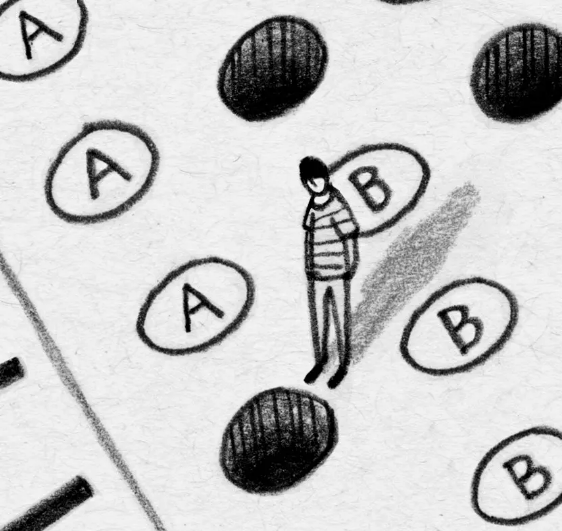
。。。黄蔷薇
我们每天发表一篇文章来表彰第五届年度学生社论大赛的前 10 名获奖者。
下面是彭艾伦(Alan Peng)的文章,他17岁。
In 2015, eleven teachers were convicted of racketeering and other crimes in the infamous Atlanta Public Schools cheating scandal, in which “inordinate pressure” from top administrators to meet standardized test score targets or face severe consequences led the teachers to cheat on state standardized tests. Sadly, such cases of coordinated, large-scale cheating are surprisingly pervasive, underscoring the undue importance attached to standardized test results. These test results are used in an admirable effort at accountability, but the process of accountability via standardized testing is now deeply flawed. Testing has evolved into an industry, a game for test companies and policymakers; everyone benefits — except the students and educators, who are just cogs in the machine.
For instance, as part of the process, teachers are forced to spend more and more time “teaching to the test,” wasting valuable instruction time. This wouldn’t be such an issue if the tests are high-quality or instructive, but they aren’t, for a variety of reasons. First, they’re unfair. Research has shown that the tests nontrivially discriminate against different races and socioeconomic backgrounds. Consequently, since standardized tests compare schools and districts of all different backgrounds, affluent schools are rewarded and struggling schools are punished.
Second, they’re inaccurate. Standardized tests often involve multiple errors or ridiculous content; for instance, the test company Pearson has occasionally misprinted tests, misplaced or misgraded answer sheets, and faced major technical issues. In 2012, an absurd story involving an anthropomorphic pineapple in a contrived remake of “The Tortoise and the Hare” graced the desks of middle schoolers across several states, with senseless questions that stumped even teachers. Clearly, these tests are managed not by educational experts, but by profit-seeking companies.
But most importantly, they test for the wrong things. With their pervasive focus on multiple choice and shallow thinking, standardized tests ignore creativity, grit and depth of understanding, thus turning students into robots. The real world requires deep, innovative thinkers, but tests encourage students to automatize themselves.
Another oft-cited reason for testing is that their objective results allow instructors to better address their students’ needs. However, these teachers have been trained professionally, usually have known the students in a much more personal, holistic and genuine context for several months, and often don’t even get the results back before the end of the year, and so this argument doesn’t hold much water.
Accountability-based testing can still be salvaged. Placing more control in the hands of educators would allow them to rework tests to be more pedagogically meaningful, and results should only be interpreted with the whole context in mind. Otherwise schools will just turn into factories for producing high test scores.
Works Cited
Chapman, Ben, and Rachel Monahan. “Talking Pineapple Question on State Exam Stumps ... Everyone!” New York Daily News, 20 April 2012.
“How Useful Are Standardized Tests?” The New York Times, 17 Feb. 2015.
“Racial Bias Built into Tests.” FairTest.
Strauss, Valerie. “How and Why Convicted Atlanta Teachers Cheated on Standardized Tests.” The Washington Post, 1 April 2015.
Strauss, Valerie. “Pearson’s History of Testing Problems - a List.” The Washington Post, 21 April 2016.